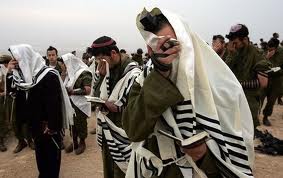Rabbi Akiva’s Martyrdom
When the Romans decreed that teaching Torah is a crime punishable by death, Rabbi Akiva’s reaction was not surprising. The pre-eminent scholar, who had supported Bar Kochba in his revolt against Rome, gathered people together and gave public Torah lectures.
Before long, Rabbi Akiva was charged and convicted. When the rabbi was taken out for public execution, it was the hour for reciting the Shema prayer. As the executioners flayed his skin with iron combs, Rabbi Akiva recited the Shema, concentrating on fulfilling its words: to love God “with all your heart, soul, and might.”
The Talmud (Berachot 61b) records Rabbi Akiva’s final conversation before his death. His students questioned him, “Our master! Even to this extent?”
The scholar responded:
“All my life I have been troubled by this verse, “You shall love God… with all your soul.” As I have explained its meaning: “all your soul,” even if they take your life. I have always wondered: will I ever have the privilege of fulfilling this mitzvah? And now that the opportunity has finally arrived — shall I not seize it?”
This exchange between Rabbi Akiva and his students requires clarification. What exactly did his disciples mean when they asked, “Even to this extent?”
The Purpose of Shema
One might think that the daily recitation of Shema is a preparatory act. Each day we accept upon ourselves the reign of Heaven, and prepare ourselves to love God, even at the cost of our lives. This daily declaration ensures that we will have the necessary reserves of courage and commitment should there arise a need for the ultimate sacrifice of martyrdom.
Therefore, the students were surprised. Their teacher had already withstood the test. He had accepted martyrdom with a noble and resolute love of God. Even the cruelest instruments of torture had not deterred him. What need, then, was there for Rabbi Akiva to recite this final Shema? Why prepare for that which he was now already fulfilling?
Rabbi Akiva, however, understood the intrinsic value of Shema. This declaration of love for God and acceptance of His rule is not just a tool to train the spirit. Each recitation of Shema is in itself a wonderful act. Every time we whole-heartedly declare God’s unity, our souls are uplifted in holiness and closeness to God. The Shema is not just a means by which we prepare ourselves; its very recitation brings a spiritual elevation.
Until his final declaration of Shema, Rabbi Akiva had recited the Shema with the thought that he was willing to sacrifice his life — “with all your soul” — for love of God. His entire life, he had wondered whether he would be able to fulfill the mitzvah of Shema in its most extreme, most demanding, form. “Will I ever have the privilege of fulfilling this mitzvah to its utmost?” At the hands of the Romans, he was able to accept the reign of Heaven while sacrificing his life — not just as a mental vision, but in real life.
His Soul Departed With Echad
The Talmud relates that as Rabbi Akiva concentrated on the last word of Shema, his soul departed.
Rabbi Akiva breathed his last with the word Echad — “God is one.” A master of Jewish law, the scholar was able to infer legal rulings from the smallest markings in the text of the Torah (Menachot 29b). In the final analysis, however, all the detailed laws and myriad explanations that he had propounded during his lifetime were all part of a single harmonious system. Everything Rabbi Akiva had taught shared the same underlying theme: how to live life according to the supreme principle of God oneness. It was thus fitting that his final word should be Echad.
(adapted from Ein Eyah vol. II, pp. 344-345)

